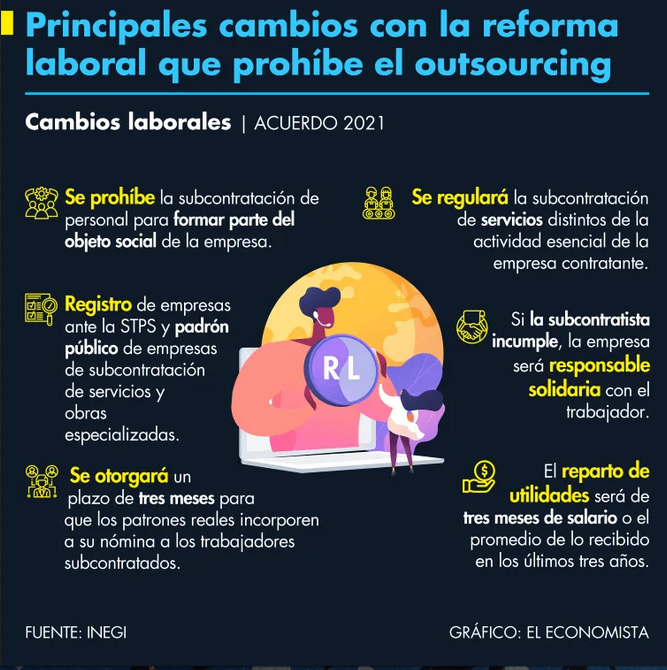Note published on April 8 in El Economista, Empresas [Companies] Section by María del Pilar Martínez.
Read original source
Note published on April 9 in Diario Marca, General, Nacionales [General, National] Section by Agencies’ Information.
Read original source
Note published on April 9 in El Pulso Laboral, Mundo Laboral y RR.HH. [Labor World and HR] Section by María del Pilar Martínez.
Read original source
One of the coming changes with the reform on outsourcing matters is labor inspection; according to data from the Department of Labor and Social Welfare, from 2012 to 2018 no inspections were conducted in companies to detect bad practices due to outsourcing; therefore, this is an aspect that is sought to be strengthened through the bill.

One of the coming changes with the reform on outsourcing matters is labor inspection; according to data from the Department of Labor and Social Welfare (STPS), from 2012 to 2018 no inspections were conducted in companies to detect bad practices due to outsourcing; therefore, this is an aspect that is sought to be strengthened through the bill.
According to the ruling issued by the commissions on Labor and Social Welfare and Treasury, Article 1004-A establishes that any employer that does not permit inspection and surveillance ordered by the labor authorities in its establishment will be notified that it has to submit all required information and, should it fail to do so, it will be assumed that it does not have said information.
In addition to the foregoing, the fact of not allowing the performance of the inspection will cause it to be subject to a fine of 250 to 5000 times the Unit of Measure and Update”, states the article in the bill.
According to Pablo Franco, president of the Union of Jurists of Mexico, this represents progress in preventing employers from avoiding inspections “I consider that all possibilities for the employer to avoid inspections must be eliminated, the ruling takes measures in labor and tax legislation; I believe that it would also be necessary to take them in criminal matters, in order to guarantee that there is no possibility of eluding the inspection without penalization, both for the employer and for those who might be accomplices in the refusal, opposition and/or avoidance of the procedure.”
He added that the ruling made by the Commissions on Labor and Social Welfare and Treasury retakes the agreement with the sectors – reached last Monday, April 5 – and, therefore, an additional legislative procedure may be necessary in order to complement Article 180 of the Federal Criminal Code .
For his part, Fernando Yllanes, president of the Commission on Social Security and Human Resources of Concamin [Confederation of Industrial Chambers of the United Mexican States], said that there have been penalties in the labor law for refusing an inspection; but “now with the reform, the emphasis is on inspections related to subcontracting; It should be known that with these changes, if an anonymous complaint is received, it will be dealt with, and if the employer does not produce the documents, it can be subject to a fine.”
Yllanes explained that this new wording is intended to discourage companies from using bad practices, indeed, he said, “the information that the IMSS has will now also be shared with the Department of Labor; that is, anyway, the authority will have the data of the companies that have workers with subcontracting schemes, which is allowed, but only in the case of specialized subcontracting”.

| Key changes with the labor reform that prohibits outsourcing | ||
| Labor changes | 2021 AGREEMENT | ||
| Subcontracting of personnel to be part of the corporate purpose of the company is prohibited.
Registration of companies before the STPS [Department of Labor and Social Welfare] and the public registry of companies subcontracting specialized services and works. A term of three months will be granted for the true employers to incorporate subcontracted workers into their payroll. |
Subcontracting of services different from the essential activity of the contracting company will be regulated.
If the subcontractor fails to comply, the company will be jointly liable toward the worker. Profit sharing will be of three months of salary or the average of the amount received in the last three years. |
|
| SOURCE: INEGI [National Institute of Statistics and Geography] | ILLUSTRATION: EL ECONOMISTA | |
He recalled that only outsourcing companies are registered in the National Registry; contracts are not; “the one who reports the contracts is the company, that is, the company that does have an employment relationship and that is the data that will be shared among authorities.”
Meanwhile, Héctor de la Cruz, of the D&M Abogados Law Firm, said that “the fact of not allowing the inspection and not presenting the required documentation or evidence creates the assumption that that labor standards that were sought to be verified through the inspection were not complied with; therefore, in addition to the fine for not allowing the inspection to be carried out, the company will be subject to the fines for non-compliance, in violation of workers’ rights.”





